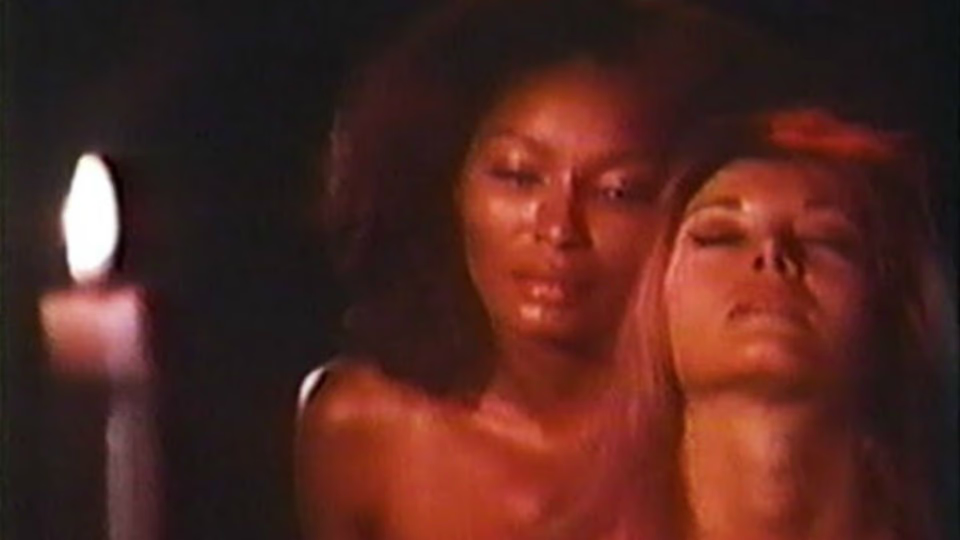Stop!

Writer Michael and his wife Lee drift through their middle-class existence. Michael inherits his brother’s Puerto Rican estate. He and Lee decamp there, hoping the change of scenery will spark their loveless marriage. It does not and Michael spirals into self-destructive behavior. Spoilers follow.
Warner Bros. took writer-director Bill Gunn’s debut feature, re-edited it, slapped it with an unearned X-rating, then shelved it without a release. I watched a VHS rip that may, or may not, be Gunn’s original cut.
The story begins straightforward enough. Michael and Lee exist trapped in a co-dependent relationship. Michael epitomizes privileged malaise, saying:
I’ve only felt three things very strongly in my life. The desire to love. The desire to write. And the desire to commit suicide. You know, I’ve never felt hunger. I think I’ve been rather fortunate never to have been hungry. I actually believe that hunger… at some decisive moment in one’s life may give rise to things that might destroy our society and everything in it.
As the couple settles into their new life, Michael’s drinking increases. He stops writing, growing restless. One day, Lee comes home from shopping to find Michael atop a whore, grunting his way to a climax before rolling over and passing out. The whore locks eyes with Lee, dresses and asks Lee for lipstick and her payment, never breaking eye contact.
Once Michael sobers up, Lee walks out, but doesn’t get far before Michael finds her and falls prostrate, begging her to take him back.
This doesn’t last long. Soon after, over breakfast at a restaurant, Michael tells Lee he’s leaving her, saying:
I really think I love you. I don’t know. Sometimes you’re like the only habit I have… you’re like an addiction to me.
Do you know what it means to be a wife? Do you know the difference between a wife and a whore? Do you know that sometimes I want you to be a whore for me? Do you know that?
Another couple enters, and Michael recognizes the man. His name is Richard, hers Marlene. The two couples dine together. Richard eyes Lee. She welcomes the attention. Richard invites them for drinks aboard his yacht later that afternoon. Michael starts to decline but Lee interrupts, saying, “We’d love to.”
Aboard the ship, Richard continues flirting with Lee. She invites them to dine with her and Michael that evening. After dinner, the four visit a nightclub. Across the room, Lee spies the whore and raises her glass. The whore tips hers in return.
Then things get weird.
Richard excuses himself, and Michael, Lee, and Marlene return to Michael and Lee’s house. Marlene flirts with Michael and the pair fall to the couch locked in an embrace. As they caress each other’s bodies, Lee paints Michael’s toes, leading to fits of laughter from all involved. The threesome retires to the bedroom, with Marlene bringing a tray full of candles.
Gunn shifts to extreme close-ups. It’s unclear who we’re watching or what they’re doing, but it’s a lot of skin.
Then morning.
Lee wakes up alone in the bedroom and a look of shame overwhelms her.
Richard arrives, closes the windows, mixes a drink laced with drugs, rapes Michael, then chases Michael through the surrounding woods with a gun before shooting him.
Or not.
The drink may not have been drugged.
The sex may have been consensual or even imaginary.
We see Richard, Lee, and Marlene around the breakfast table, a pregnant silence between them. Lee gets up and walks to the window.
Michael enters.
Then, in a scene that mirrors the film’s opening, Richard and Marlene are gone and Lee and Michael sit across from one another. Lee looks into the camera and extends her open hand as if saying, “Stop!”
Weird indeed. I sought the film out because of Gunn’s better-known, Ganja & Hess. I was hoping for an inroad to that film’s oblique intent, but found another enigma.
Stop explores similar themes of creative angst, cautionary lust, and co-dependence. Indeed, one could view Ganja & Hess as Gunn’s second run at the material. This first draft proves less polished and resonant, but close enough that it invites questions. What edits did the studio make? Did Gunn want to cast Stop with black actors? Imagining Stop with the races flipped proves intriguing—and tinges the third act’s sexuality with a heightened cultural taboo.
Perhaps one day Stop will see a proper home-video release, with commentaries offering insight. Until then, these mysteries persist.